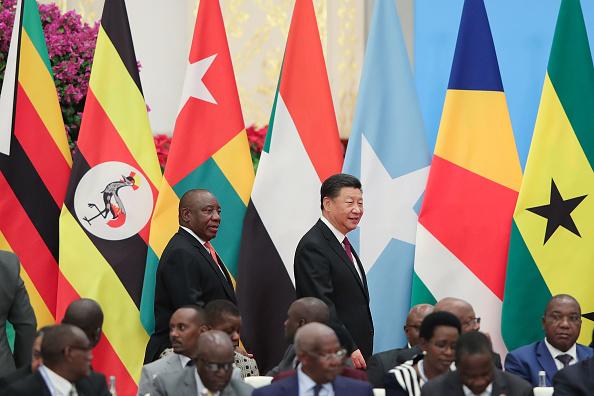Chinese leader Xi Jinping sought to downplay China’s geopolitical ambitions in Africa during a cooperation forum in Beijing, by insisting that China doesn’t “intervene in African nations’ internal politics,” “will not attach any political conditions to aid for Africa,” and “will not use investments and financing in Africa to seek political gains.”
But China isn’t shy about its desire to court economic ties with Africa. Xi pledged $60 billion to African nations at the two-day forum’s opening on Sept. 3, promising that government debt from Chinese interest-free loans due by year-end would be written off for the poorest African nations.
The $60 billion will include $15 billion of aid, interest-free loans, and concessional loans; a credit line of $20 billion; a $10 billion special fund for China–Africa development; and a $5 billion special fund for imports from Africa.
The remaining $10 billion will come in the form of investments by Chinese companies in Africa over the next three years, Xi said.
On the second day of the forum, which was attended by 53 heads of state from the continent, Beijing’s special envoy for Africa, Xu Jinghu, made another attempt to push back against criticism of China’s relations with Africa, claiming that China is helping Africa develop, and not pile on debt.
The Chinese regime’s attempted assurances run counter to news headlines and observers’ concerns about China’s investments in the continent thus far.
China’s Interests in Africa
For example, Burkina Faso announced in March that it would cut ties with Taiwan, after Beijing pressured the African country to recognize “one China.”
The Chinese Communist Party considers Taiwan a part of its territory and has tried to preclude any international space for Taiwan, by convincing other nations to cut diplomatic ties with the country.
Helmut Asche, a professor of Africa studies at Johannes Gutenberg University Mainz in Germany told Apple Daily, a Hong Kong newspaper, that Beijing’s push for countries to adopt the “one China” policy is a prime example of the so-called “political condition” Xi mentioned. He also noted that soon after Zimbabwe’s new leader Emmerson Mnangagwa came to power, he visited China, showing Beijing’s influence over political affairs there.
China’s investments in Africa also are often connected to Beijing’s economic development goals. In recent years, China has poured financial aid into Congo in order to secure mining rights to lithium and cobalt deposits there—key materials for making electric car batteries. Electric vehicles are among the 10 tech sectors that Beijing has set as priorities for development, as outlined in the “Made in China 2025” agenda, a plan for China to become a high-tech manufacturing giant.
And One Belt, One Road (OBOR), China’s ambitious initiative to finance infrastructure projects across Asia, Africa, and Europe, has come under scrutiny for burdening poor nations with debt.
Djibouti, for example, the site of China’s only overseas military base, owes nearly 82 percent of its external debt to China, according to a report on the debt risk in OBOR-participating countries by the U.S.-based think tank Center for Global Development.
“With Western markets much harder to penetrate, developing a consumer base for Chinese manufacturers in developing markets is high on Beijing’s agenda,” read a March 2016 article in The Africa Report, a monthly news magazine. It cited the example of Xiaomi, which appointed local distributor Mobile in Africa Limited to sell its phones to 50 countries in sub-Saharan Africa.
More Investments
Indeed, there is evidence that Beijing is shifting much of its trade focus to Africa, as an ongoing trade war with the United States has threatened China’s economy.
At a public forum in Beijing held in August, former Chinese vice minister of commerce Wei Jianguo, who is now vice-chairman of a central government-affiliated think tank, said that China’s annual sales to Africa could exceed $500 billion within the next five years, making that continent a bigger market for Chinese exporters than the United States.
Trade volume with Africa has already exceeded $300 billion, according to China Center for International Economic Exchanges, the think tank that employs Wei.
Meanwhile, some netizens expressed displeasure at Beijing’s willingness to splash money around abroad while citizens at home are suffering from several recent natural disasters and other domestic problems.
Reuters contributed to this report.




